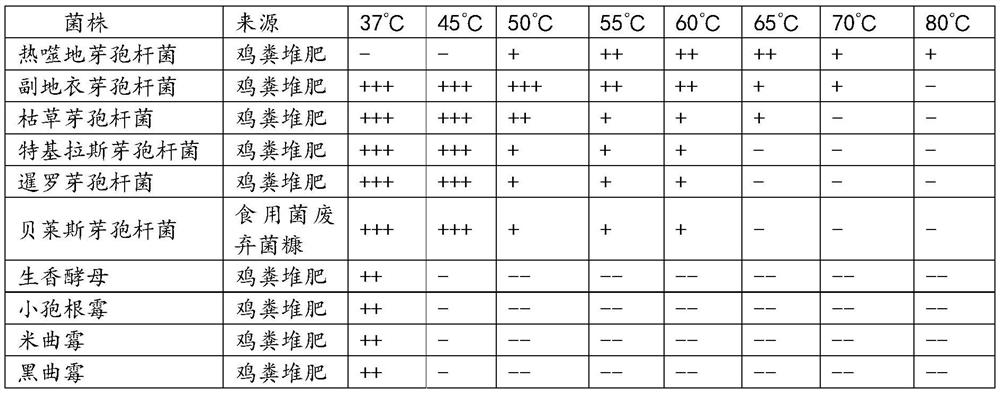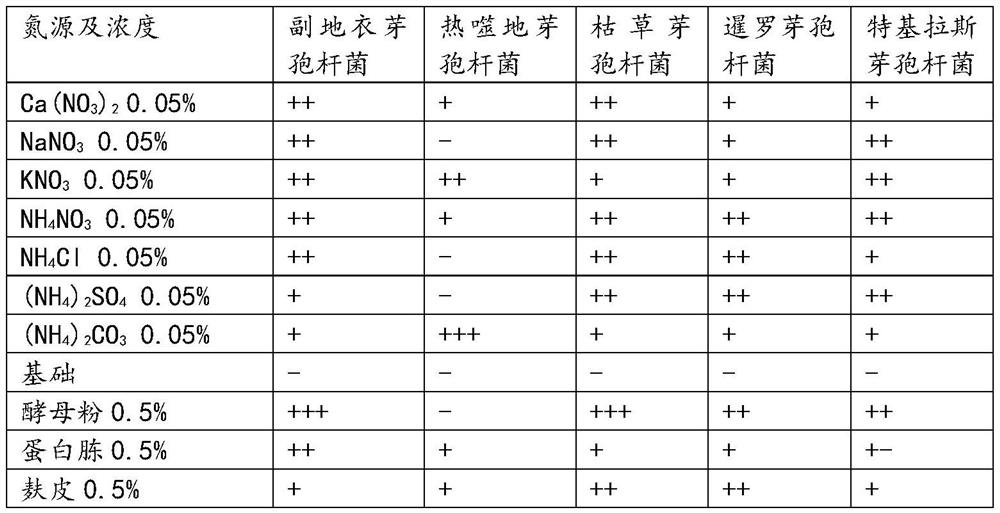Microecological preparation for chicken manure high-temperature decomposition deodorization, and preparation method thereof
A micro-ecological preparation and high-temperature decomposing technology, which is applied in the direction of microbial-based methods, biochemical equipment and methods, and the preparation of organic fertilizers, can solve the problems of poor strain adaptability, long decomposing cycle, and heavy odor, so as to ensure dryness degree, extend shelf life, and improve compost quality
- Summary
- Abstract
- Description
- Claims
- Application Information
AI Technical Summary
Problems solved by technology
Method used
Image
Examples
Embodiment 1
[0031] Example 1 - Temperature tolerance test of different strains
[0032] Bacillus, mold and yeast strains isolated from chicken manure compost and from edible fungus waste chaff were inoculated into LB or PDA solid medium to test their tolerance to temperature, the results are shown in Table 1 .
[0033] Table 1 - Growth of strains at different temperatures
[0034]
[0035] Note: +++ grows well, ++ grows well, + can grow, - means no growth, -- means no investigation
[0036] From the test results in Table 1, it can be seen that yeast, Rhizopus microspora, Aspergillus oryzae and Aspergillus niger grow well at 37°C; It grows well at 45°C, but poorly above 50°C; Bacillus subtilis grows well at both 37°C and 45°C, but grows well at 50°C but slowly; Bacillus paralicheniformis grows well at 60°C and is relatively slow. And it can grow at 70 ℃; while Geobacillus thermophagus cannot grow below 45 ℃, it can grow at 50 ℃, and it grows well at 55-65 ℃, and it can also grow at 7...
Embodiment 2
[0038] Example 2 - Utilization test of carbon and nitrogen sources by different Bacillus species
[0039] The strains were inoculated into different carbon and nitrogen sources, respectively, to test their utilization of carbon and nitrogen sources. The results are shown in Tables 2 and 3.
[0040] Table 2 - Growth of strains in medium containing different nitrogen sources
[0041]
[0042]
[0043] Note: +++ grows well, ++ means good growth, + means able to grow, +- means almost no growth, - means no growth
[0044] Since the high-temperature decomposing function mainly depends on Bacillus, and the utilization of inorganic nitrogen sources and organic nitrogen sources will determine the emission of odors, it can be seen from the test results in Table 2 that these strains have certain differences in the utilization of nitrogen sources, which can It ensures that the different components of chicken manure compost are effectively degraded, and at the same time avoids growth ...
Embodiment 3
[0049] Example 3 - Effects of different strains on fermentation temperature rise
[0050] Different strains have different growth delay periods, and a short delay period can initiate the rapid progress of fermentation. The growth of Rhizopus microspora, Aspergillus oryzae, Aspergillus niger and Bacillus was observed by using bran culture based on 30 ℃ culture. The results are shown in Table 4.
[0051] Table 4 - Growth of strains at different times of strain culture
[0052]
[0053] From the results in Table 4, it can be seen that the surface of the bran of Rhizopus microspora was covered with mycelium and there were a lot of water droplets on the bottle wall for 20 hours, indicating that the strain was vigorously fermented, and the respiration produced a lot of heat, which was helpful for the temperature of the fermentation to increase. At the same time, it is also reflected on the side, but the easy agglomeration of too much Rhizopus microspora has a relatively adverse ...
PUM
 Login to View More
Login to View More Abstract
Description
Claims
Application Information
 Login to View More
Login to View More - R&D
- Intellectual Property
- Life Sciences
- Materials
- Tech Scout
- Unparalleled Data Quality
- Higher Quality Content
- 60% Fewer Hallucinations
Browse by: Latest US Patents, China's latest patents, Technical Efficacy Thesaurus, Application Domain, Technology Topic, Popular Technical Reports.
© 2025 PatSnap. All rights reserved.Legal|Privacy policy|Modern Slavery Act Transparency Statement|Sitemap|About US| Contact US: help@patsnap.com



